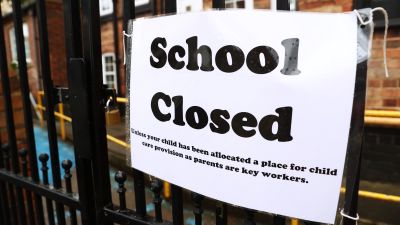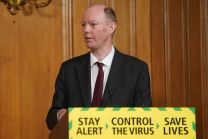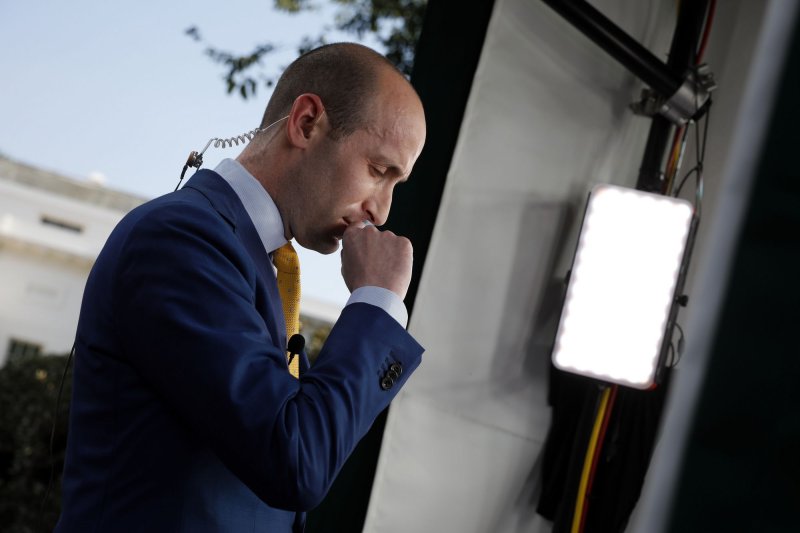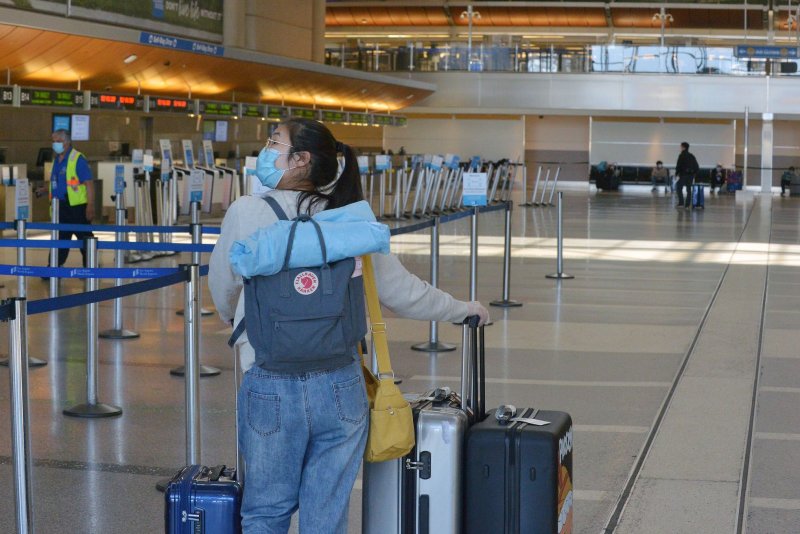Protest Against Virus Curbs Draws Thousands
By AFP News
08/01/20
Loudly chanting their opposition to face masks and vaccines, thousands of people gathered in Berlin on Saturday to protest against coronavirus restrictions before being dispersed by police.
Police put turnout at around 20,000 -- well below the 500,000 organisers had announced as they urged a "day of freedom" from months of virus curbs.

08/01/20
Loudly chanting their opposition to face masks and vaccines, thousands of people gathered in Berlin on Saturday to protest against coronavirus restrictions before being dispersed by police.
Police put turnout at around 20,000 -- well below the 500,000 organisers had announced as they urged a "day of freedom" from months of virus curbs.

Demonstrators, some of whom have branded the pandemic a conspiracy, demanded a "day of freedom" in protest against virus curbs Photo: AFP / John MACDOUGALL
Despite Germany's comparatively low toll, authorities are concerned at a rise in infections over recent weeks and politicians took to social media to criticise the rally as irresponsible.
"We are the second wave," shouted the crowd, a mixture of hard left and right and conspiracy theorists as they converged on the Brandenburg Gate, demanding "resistance" and dubbing the pandemic "the biggest conspiracy theory".
Despite Germany's comparatively low toll, authorities are concerned at a rise in infections over recent weeks and politicians took to social media to criticise the rally as irresponsible.
"We are the second wave," shouted the crowd, a mixture of hard left and right and conspiracy theorists as they converged on the Brandenburg Gate, demanding "resistance" and dubbing the pandemic "the biggest conspiracy theory".

As politicians slammed the rally, a small number of counter-protesters gathered, one holding a sign reading "we are many. Berlin against Nazis" Photo: AFP / John MACDOUGALL
Few protesters wore a mask or respected the 1.5-metre (five-foot) social distancing requirement, an AFP journalist reported, despite police repeatedly calling on them via megaphone to do so.
After several warnings, Berlin police ordered demonstrators to leave the area at the end of the afternoon

Marchers unveil a banner reading "health is more than the simple absence of illness" Photo: AFP / John MACDOUGALL
Police tweeted they had launched legal proceedings against organisers for not respecting virus hygiene rules.
A handful of people held a counter demonstration. Dubbing themselves "grandmothers against the extreme right", they hurled insults against "Nazi" protesters.
The protest's "Day of Freedom" slogan echoes the title of a 1935 documentary by Nazi-era film-maker Leni Riefenstahl on a party conference by Hitler's National Socialist German Workers' Party.

Police tweeted they had launched legal proceedings against organisers for not respecting virus hygiene rules.
A handful of people held a counter demonstration. Dubbing themselves "grandmothers against the extreme right", they hurled insults against "Nazi" protesters.
The protest's "Day of Freedom" slogan echoes the title of a 1935 documentary by Nazi-era film-maker Leni Riefenstahl on a party conference by Hitler's National Socialist German Workers' Party.

Although infections have been creeping back up in Germany, some marchers say imposing rafts of restrictions amount to "scare tactics" Photo: AFP / John MACDOUGALL
Several politicians condemned the demonstration as Germany seeks to minimise transmission of a virus which had claimed just over 9,000 deaths as of Saturday -- a far lower toll than its neighbours.
Saskia Esken of the Social Democrats, a junior coalition partner in Angela Merkel's government, blasted the demonstrators as "Covidiots".
Several politicians condemned the demonstration as Germany seeks to minimise transmission of a virus which had claimed just over 9,000 deaths as of Saturday -- a far lower toll than its neighbours.
Saskia Esken of the Social Democrats, a junior coalition partner in Angela Merkel's government, blasted the demonstrators as "Covidiots".

Thousands railed against the German government's measures to combat the COVID-19 pandemic Photo: AFPTV / Raphaelle LOGEROT
In a tweet Esken railed: "No distancing, no mask. They are not only putting at risk our health but also our success against the pandemic as well as economic recovery, education and society. Irresponsible!"
Health Minister Jens Spahn agreed: "Yes, demonstrations should also be possible in times of coronavirus, but not like this. Distance, hygiene rules and masks serve to protect us all, so we treat each other with respect."
Jan Redmann, regional head of Merkel's Christian Democrats in the eastern state of Brandenburg, also took aim at the marchers.
"A thousand new infections a day still and in Berlin there are protests against anti-virus measures? We can no longer allow ourselves these dangerous absurdities," Redmann complained.
Interior Minister Horst Seehofer, who hails from Merkel's traditional right ally the Christian Social Union, showed a measure of understanding, however.
"Of course there are always different opinions regarding infringements of basic rights and restrictions of freedom -- first, it's normal and, in my view, it's not the majority," Seehofer told Bavarian daily Passauer Neue Presse.
Saturday saw 955 new infections -- a level which the country had not seen since May 9, according to the Robert Koch health institute.
But marchers insist the risk of catching the virus is being much overblown.
"It's pure scare tactics. I don't see any danger with the virus," one marcher, Iris Bitzenmeier, told AFP.
"I don't know any other sick people. I knew many in March -- skiers, holidaymakers. Something was really afoot in February -- but now there are no longer any sick people," she insisted.
"People who don't inform themselves -- unlike ourselves -- remain ignorant and believe what the government tells them. They get caught up in the fear the government puts in our heads -- and that fear weakens the immune system," she said.
In a tweet Esken railed: "No distancing, no mask. They are not only putting at risk our health but also our success against the pandemic as well as economic recovery, education and society. Irresponsible!"
Health Minister Jens Spahn agreed: "Yes, demonstrations should also be possible in times of coronavirus, but not like this. Distance, hygiene rules and masks serve to protect us all, so we treat each other with respect."
Jan Redmann, regional head of Merkel's Christian Democrats in the eastern state of Brandenburg, also took aim at the marchers.
"A thousand new infections a day still and in Berlin there are protests against anti-virus measures? We can no longer allow ourselves these dangerous absurdities," Redmann complained.
Interior Minister Horst Seehofer, who hails from Merkel's traditional right ally the Christian Social Union, showed a measure of understanding, however.
"Of course there are always different opinions regarding infringements of basic rights and restrictions of freedom -- first, it's normal and, in my view, it's not the majority," Seehofer told Bavarian daily Passauer Neue Presse.
Saturday saw 955 new infections -- a level which the country had not seen since May 9, according to the Robert Koch health institute.
But marchers insist the risk of catching the virus is being much overblown.
"It's pure scare tactics. I don't see any danger with the virus," one marcher, Iris Bitzenmeier, told AFP.
"I don't know any other sick people. I knew many in March -- skiers, holidaymakers. Something was really afoot in February -- but now there are no longer any sick people," she insisted.
"People who don't inform themselves -- unlike ourselves -- remain ignorant and believe what the government tells them. They get caught up in the fear the government puts in our heads -- and that fear weakens the immune system," she said.
Copyright AFP. All rights reserved.

People protest outside the Bundestag in Berlin. Thousands gathered nearby to demonstrate against Germany's coronavirus restrictions | Felipe Trueba/EPA
German politicians warned Sunday of a coronavirus resurgence and called for vigilance after thousands of people, defying calls to wear masks and take other precautions, protested in Berlin against measures to curb the pandemic's spread.
Markus Söder, the premier of the regional state of Bavaria and a potential candidate to succeed Chancellor Angela Merkel, warned on Twitter that "we have to expect that corona will come back again with full force. I am very worried about the rising case numbers in Germany. Total alertness is needed, and that's why now is not the time for easing restrictions or naive carelessness."
He also expressed skepticism about launching the German Bundesliga football league without any restrictions. "Ghost games, yes, but I find stadiums with 25,000 spectators difficult to imagine. That would be the wrong signal," he said.
In a separate interview with the Sunday edition of the Bild newspaper, he warned that the virus "would remain a constant challenge which will keep us permanently under pressure."
Germany has won international praise for its handling of the pandemic and the country has been hit less hard than other European nations such as Italy, Spain and France. But the Robert Koch Institute, the government's main biomedical body, warned last week that the number of reported cases has been rising since the beginning of July.
Söder's concerns were echoed by Saskia Esken, co-leader of the Social Democrats, Merkel's junior coalition partners. In an interview with newspaper Der Tagespiegel, Esken, said she "simply saw the realistic danger of a second wave," cautioning that a return to pre-pandemic habits could undermine the fight against the virus.
On Saturday, Esken lashed out at the protesters in Berlin, thundering on Twitter: "Thousands of Covidiots are celebrating themselves as 'the second wave,' without distancing, without masks. They are putting at risk not only our health, but our successes against the pandemic, to revive the economy, education and society. Irresponsible!"
Health Minister Jens Spahn also chimed in. "Yes, demonstrations should be possible in Corona times. But not like this. Distancing, hygiene rules and facemasks are meant to protect us all," he said. On Friday, he raised the alarm about rising infection numbers and called on holiday returnees to get tested to prevent the spread of the virus.
Anja Karliczek, Germany's education minister, on Sunday called for requiring students to wear masks inside schools when they return to classrooms in the fall.
It's "comprehensible when [regional] states want to forgo the social distancing rules at schools because the spatial conditions would only allow limited in-person classes," Karliczek told the Sunday edition of daily Welt.
"However, in-person classes will only work when additional hygiene regulations and rules for wearing masks and social distancing in school yards and corridors are strictly observed," she said.
The states of Berlin, Bavaria and Baden-Württemberg have already introduced such requirements. In Germany, education policy is primarily the responsibility of regional states.
Police said some 17,000 people took part in Saturday's demonstration in Berlin, organized to protest government-enforced restrictions. The gathering was organized with the title "The end of the pandemic — day of freedom." Some participants claimed the virus was "the biggest conspiracy theory," according to media reports.
Olaf Sundermeyer, an expert on the far right, cautioned that many people don't believe that the coronavirus exists. Speaking to German broadcaster ARD, he said that protesters believed the pandemic would be an invention to subdue the people: "Many say they are being systematically lied to."

Protesters in Berlin. A senior local official said the demonstration was a "disaster" | John MacDougall/AFP via Getty Images
Thousands protest against coronavirus measures in Berlin
Demonstrators ignore hygiene rules to rally in German capital.
By VINCENT MANANCOURT
8/2/20,
Thousands of people, packed close together and not wearing face masks, protested in Berlin on Saturday against official measures intended to curb the spread of the coronavirus.
Police said they would file charges against the organizer of the gathering as demonstrators had not followed hygiene rules such as maintaining social distancing or wearing a mask covering nose and mouth.
Some 17,000 people took part in the demonstration at its peak, according to police.
The gathering was organized with the title "The end of the pandemic — day of freedom." Some demonstrators chanted "the biggest conspiracy theory is the pandemic," according to German media reports.
A Stuttgart-based organization called Querdenken 711 — which roughly translates as "thinking outside the box 711" — organized the rally.
The interior minister for the city of Berlin, Andreas Geisel, said on Friday that neo-Nazi organizations had also called for people to participate in the march. German media outlets noted that "Day of Freedom" was also the name of a Nazi propaganda film documenting the party's 1935 party congress in Nuremberg.
One banner at the march called for politicians such as German Health Minister Jens Spahn, Bavaria's state premier Markus Söder, Chancellor Angela Merkel and leading virologist Christian Drosten to be "locked away."
Protesters also "aggressively asked" journalists to remove their masks by protestors, newspaper Der Tagesspiegel reported. A video by Querdenken 711 before the march said the group was peaceful and called on attendees to be polite to journalists.
Sawsan Chebli, a senior official in the Berlin city government, called the protest "a disaster."
"I just came from abroad and see these pictures. Many look to Germany, and admire us for how we have dealt with corona. Such pictures are a disaster. They destroy everything. They endanger human lives and destroy livelihoods. They scare me," she tweeted.

















